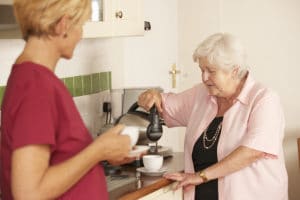The New Cancer Treatment Advancement That’s Eliminating Tumors

Learn how the newest advancement in cancer treatment is helping to reduce tumors.
As fall approaches, so does cold and flu season, and our immune systems are sure to be put to the test. Fortunately, our natural immunity is incredible in its capability to detect and destroy invading infections. Wouldn’t it be wonderful if there was a cancer treatment that could do the same?
Well, the researchers at the National Cancer Institute (NCI) had the same idea. Scientists decided to test whether disguising cancer as a viral infection would cause the immune system to kick into gear, and the results were incredible. By injecting small amounts of peptides (viral proteins) into tumors in mice, the immune cells were stimulated, shrank the tumors, and even prevented them from growing back.
The viral peptides used were from CMV (cytomegalovirus), a common virus that is recognized by most people’s immune systems and typically does not cause any symptoms. Once someone is infected with CMV, it stays with them for life. And, as John Schiller, Ph.D. of NCI’s Center for Cancer Research explains, “It’s one of the few immune responses that gets better as you get older.”
Immunotherapy cancer treatment like this also presents the chance for long-term protection, and initial research is showing this to be the case with CMV peptide treatment. And even when mice were injected with new lung cancer cells after being cured, no new tumors developed. Similar findings were seen with multiple types of cancer as well.
Besides showing to be extremely effective in the study, additional benefits that might be gained through CMV immunotherapy include:
- Synthetic virus peptides can be produced simply and in large quantities
- Treatment doesn’t need to be customized for each person or type of cancer
- It will likely be more affordable and less time-consuming to create than other immunotherapy treatments
Dr. Schiller adds that this truly is a “simple, off-the-shelf product that you could even use in low-resource settings because it doesn’t require sophisticated molecular profiling of tumors.”
While we excitedly await the results of upcoming clinical trials, Responsive Home Care is here to assist someone you love through cancer treatment and beyond with customized home care services, including:
- Serving as a friendly companion to brighten every day
- Preparing meals that work with any prescribed dietary plans, taking into consideration alterations in smell, taste, and appetite
- Helping with household chores and laundry
- Providing accompaniment to medical appointments, treatments, and procedures
Contact us online or at (954) 486-6440 for a free consultation for additional details on our highly skilled home health services in Fort Lauderdale, FL or the nearby areas.


 If you were to list the top five emotions you experience in meeting the caregiving needs of your elderly parents, what would they be? Maybe you’d first think of emotions like love, compassion, and in some cases, even frustration or stress. Would
If you were to list the top five emotions you experience in meeting the caregiving needs of your elderly parents, what would they be? Maybe you’d first think of emotions like love, compassion, and in some cases, even frustration or stress. Would  As our parents grow older, it is not necessarily an easy task to know what our role as adult children should be. We want whatever is best for them, but if we’re not mindful, we will overstep our boundaries and discover ourselves attempting to parent our parents.
As our parents grow older, it is not necessarily an easy task to know what our role as adult children should be. We want whatever is best for them, but if we’re not mindful, we will overstep our boundaries and discover ourselves attempting to parent our parents.
 Discussing finances with senior parents can tend to be a taboo subject, and the reason behind multiple arguments, enhanced emotions, and misunderstandings. And for a good number of today’s seniors, who maintain a “Depression mentality” from years of saving for a rainy day and learning to “waste not, want not,” it is often uncomfortable for them to grant access to personal finances to adult children, and to accept the necessity to spend some of those finances on caregiving needs.
Discussing finances with senior parents can tend to be a taboo subject, and the reason behind multiple arguments, enhanced emotions, and misunderstandings. And for a good number of today’s seniors, who maintain a “Depression mentality” from years of saving for a rainy day and learning to “waste not, want not,” it is often uncomfortable for them to grant access to personal finances to adult children, and to accept the necessity to spend some of those finances on caregiving needs. If you are like many family caregivers, one of the elements of the holiday season that you look forward to the most is getting to spend quality time with your senior. This is particularly true if you are a distance caregiver who does not have the opportunity to spend as much time with your loved one as you would like. Your holiday season visits are a chance for you to reconnect with your senior and spend more time with them, as well as check in on them and ensure that they are still doing well as they age in place.
If you are like many family caregivers, one of the elements of the holiday season that you look forward to the most is getting to spend quality time with your senior. This is particularly true if you are a distance caregiver who does not have the opportunity to spend as much time with your loved one as you would like. Your holiday season visits are a chance for you to reconnect with your senior and spend more time with them, as well as check in on them and ensure that they are still doing well as they age in place. If you’re experiencing guilt because you’re a long-distance family caregiver, you need to deal with it as quickly as possible. Guilt can get in the way of caregiving and make it more difficult than it has to be.
If you’re experiencing guilt because you’re a long-distance family caregiver, you need to deal with it as quickly as possible. Guilt can get in the way of caregiving and make it more difficult than it has to be. Starting elderly home care for your aging parent can be an exceptional way to boost the benefits of the care that you already give them, fill any care gaps that might exist in what you are able to offer them, and ensure that your parent can live the lifestyle that they desire and deserve as they age in place. In order for your senior to get the most out of this care, you must ensure that you select the right type of home care for them. There are several different types of elderly home care arrangements available, up through and including live-in care, and choosing the right one is important to fulfilling their individual needs and challenges in the way that works for them.
Starting elderly home care for your aging parent can be an exceptional way to boost the benefits of the care that you already give them, fill any care gaps that might exist in what you are able to offer them, and ensure that your parent can live the lifestyle that they desire and deserve as they age in place. In order for your senior to get the most out of this care, you must ensure that you select the right type of home care for them. There are several different types of elderly home care arrangements available, up through and including live-in care, and choosing the right one is important to fulfilling their individual needs and challenges in the way that works for them.

